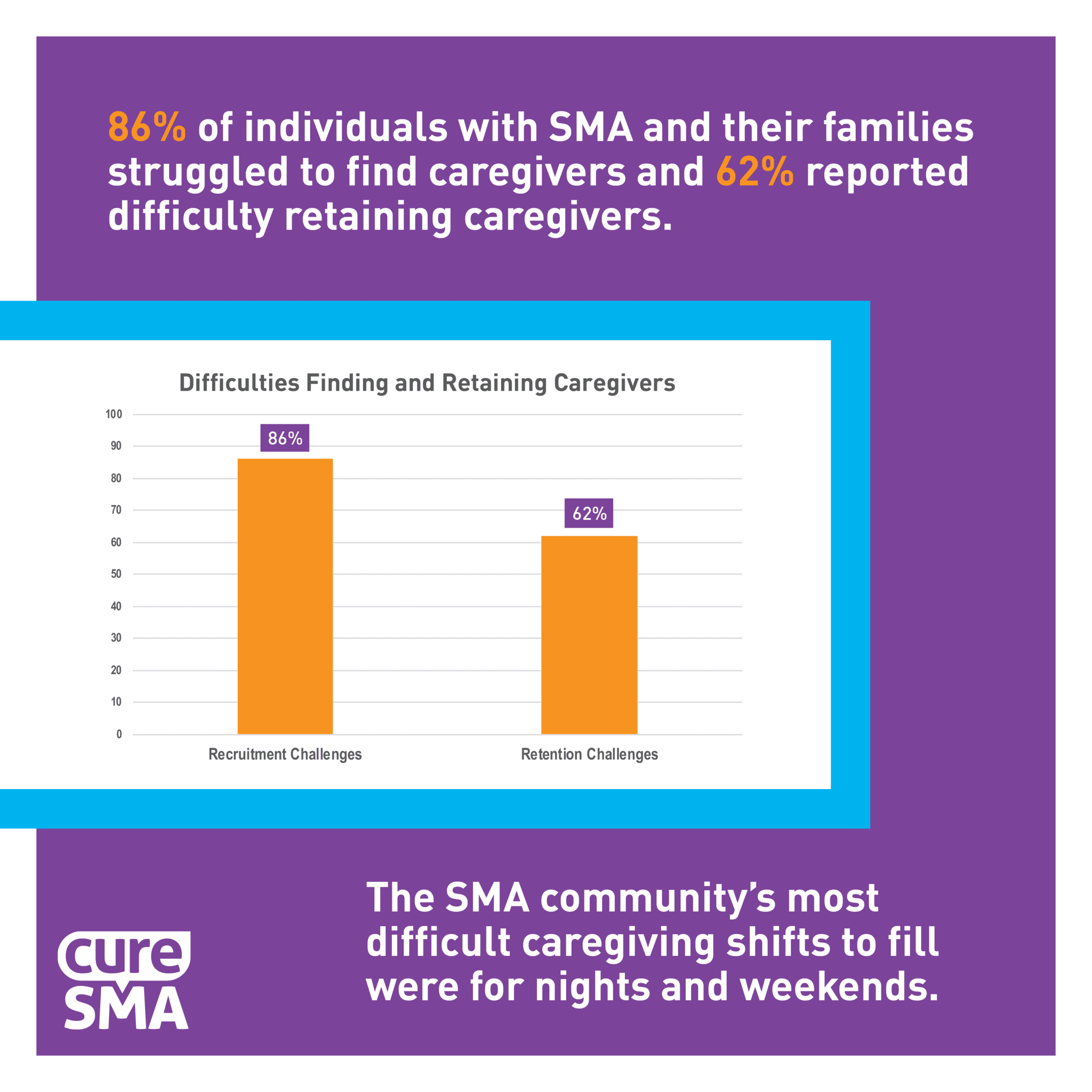Cure SMA released a national report on National Caregivers Day that chronicles the caregiving challenges experienced by individuals with spinal muscular atrophy (SMA) and recommends state and federal actions to help address their caregiver needs.
Stuck Inside: A National Report on Caregiving for Individuals with SMA features numerous first-person experiences and quotes highlighting the essential role caregivers play in the lives of children and adults with SMA, a neuromuscular disease that causes debilitating muscle loss. The Stuck Inside caregiving report found that individuals with SMA, on average, require 1 to 3 caregivers to cover 100 or more caregiving hours a week. Top caregiving needs include wheelchair transfers, bathroom support, and household duties, such as laundry, shopping, and light housekeeping. However, about 37 percent of individuals with SMA said they did not receive enough caregiving hours from their state, including one-third who sought additional paid caregiving hours from their state through an appeal and were denied. “Without caregivers and caregiving hours, I would not be able to live independently, be successfully employed, or enjoy anything fun as I would be stuck at home in bed,” said an adult with SMA featured in the report.
Other key findings from Cure SMA’s caregiving report include:
- 86 percent of individuals with SMA and their families struggled to find caregivers and 62 percent reported difficulty retaining caregivers. The SMA community’s most difficult caregiving shifts to fill were for nights and weekends.
- 79 percent of individuals with SMA relied on a non-paid caregiver (i.e., parent, partner, relative, or friend) to assist with their daily activities.
- 20 percent of family caregivers for individuals with SMA are 60 years old or older. Many individuals with SMA worry about their own safety and independence if their family caregivers become unavailable due to health, injury, or other reasons.
- 41 percent of individuals with SMA said they declined a job or school opportunity that was out of state for fear of losing their caregiving services.
- 27 percent of adults with SMA said they do not work or work only part-time to maintain their eligibility for caregiving services. Another 30 percent said their earnings or savings made them ineligible for caregiving services through their state.
- 47 percent of individuals with SMA and their families struggled to find information about paid caregiving options in their state.

“Caregiving challenges have hit a crisis point for individuals with SMA and their families,” said Maynard Friesz, Cure SMA’s Vice President of Policy and Advocacy. "It is incumbent on state and federal policymakers to take immediate steps to strengthen the direct care workforce and expand caregiving supports for individuals with SMA and others who rely on caregiving services.”
The report includes state and federal recommendations to help address the caregiving crisis in the United States, from improving online information and updating eligibility requirements for state caregiving options to promoting Medicaid coverage portability and strengthening the direct care workforce through increased wages, benefits, and training. Cure SMA’s Stuck Inside: A National Report on Caregiving for Individuals with SMA is available at: https://www.curesma.org/caregiving-toolkit/. For more information, contact Cure SMA at [email protected].
About Cure SMA:
Cure SMA is the leading national organization that represents individuals with SMA and their families across the United States. Cure SMA educates and advocates for policies that protect access to care, treatment, and services and legislation that promotes independence and community living for all individuals with SMA. Cure SMA also funds SMA research, promotes healthcare best practices, and supports the SMA community through educational events, independence packages, and equipment pools.
About SMA:
Spinal muscular atrophy is a progressive neurodegenerative disease that causes severe muscle weakness and motor function loss and impacts a person with SMA’s ability to walk, lift their arms, and independently perform key functions of everyday life. Due to the physical effects of SMA, most individuals with SMA rely on personal care attendants or other in-home support to assist with their daily living activities.


